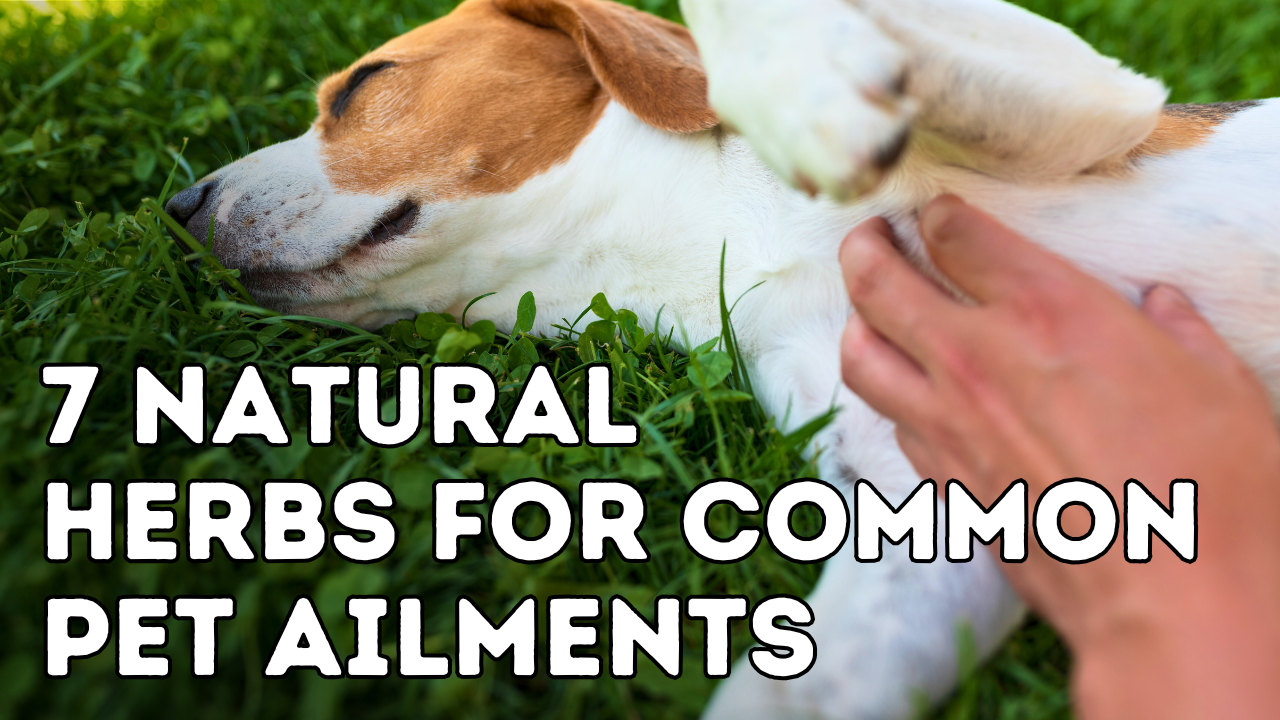7 Must-Know Medicinal Herbs for Your Pet’s Health

Herbs as Alternatives to Conventional Medication
Herbs are natural and safe alternatives to conventional medicines. They are gentle on your pet’s body, offering a much greater “margin of error" with fewer side effects than pharmaceutical drugs. One of the biggest advantages of herbs is that the entire plant works together as a cohesive whole, which makes it more effective than isolating individual components.
For example, white willow, which contains the same active ingredient as aspirin, has fewer side effects in dogs. Unlike aspirin, which commonly causes vomiting or diarrhea, white willow doesn’t cause these issues in dogs, making it a safer choice.
7 Most Important Herbs You Should Know About for Your Pets
-
Dandelion
Dandelion is a powerful diuretic and has multiple health benefits for pets. The roots are particularly beneficial for liver problems, arthritis, and even cancer. It’s one of the most complete plant foods available, offering a variety of nutrients and healing properties. -
Milk Thistle
Milk Thistle is the most studied herb for liver disease in both dogs and cats. It helps speed up the healing process from liver injuries, and it’s an essential ingredient in our Liver Support Supplement. It’s particularly beneficial if your pet suffers from liver problems. -
Aloe/Calendula
Aloe and Calendula are fantastic topical anti-inflammatories. These herbs can be used to treat various skin diseases and irritations, providing soothing relief. -
Turmeric (95% Curcumin)
Turmeric is a natural painkiller that works wonders for inflammation. It also helps reduce the chances of developing certain types of cancer. With its active compound, curcumin, turmeric can be a game-changer for pets dealing with pain and inflammation. -
Valerian
Valerian is a fast-acting, natural sedative. It’s also a holistic muscle relaxant, making it useful for pets experiencing spasms or anxiety. This herb is safe and effective for calming your pet during stressful times. -
Peppermint/Chamomile
Peppermint and Chamomile are extremely safe herbs and are effective for treating gastrointestinal issues. They act quickly and can relieve stomach upset, nausea, and indigestion in pets. -
Slippery Elm
Slippery Elm comes from the bark of the Slippery Elm Tree and is especially beneficial for pets with gastrointestinal problems. It coats the stomach and intestinal tract, making it an excellent remedy for diarrhea. It’s also helpful for treating coughs. The recommended dosage is 400 mg per 20 lbs of body weight daily. I mix the capsules with green tea and honey to help with coughs!
How to Start Using Herbs with Your Pets
There are several simple and effective ways to incorporate herbs into your pet’s care routine:
-
Herbal Creams
Herbal creams like aloe, calendula, and chamomile are excellent alternatives to steroid creams. Simply apply these creams topically to the affected skin twice daily for 7 days, then assess your pet’s response. -
Valerian Tincture
Valerian tincture is ideal for spasms and mild sedation. The recommended dose is ½ ml of the tincture per 20 lbs of body weight, given 2-3 times a day. -
Herbal Teas
Peppermint and chamomile teas are easy to make and can provide quick relief for any gastrointestinal upset. To treat your pet, make 1 cup of concentrated tea and give your pet ¼ cup per 10 lbs of body weight 2-4 times a day.
Heal Your Pet at Home!
P.S. One of the most common changes I see in blood work is elevated liver enzymes. Since the liver is responsible for filtering and processing everything in your pet’s body, it often gets affected by NSAIDs and other medications. If your pet is on these types of drugs, adding a good quality Liver Support Supplement can help maintain liver function.
Make sure it includes the two most important liver support ingredients: SAMe and Milk Thistle. Our Liver Support Supplement is one of the few products that includes both of these critical ingredients.
Check it out here:
Dr. Jones’ ULTIMATE Liver Support Formula for Dogs





My dog recently has been wobbling, like drunk, he will fall over it’s not always, just 3x over 4 months. All his blood and urine levels are good. He is 15. I don’t think it’s seizure or tumours. I’m narrowing it down to inner ear problems. Is there anything you can recommend? I’ve been doing some exercises with his ears & massage to help the crystals in his ears rebalance. I myself had the same condition a while ago lol. He’s on cod liver oil and probiotics, eats only clean food, no kibble and our garden veggies and fruit trees. He takes a sprinkle of herbs and molasses. He is 24 pounds. Thanks Christine from Mulmur, Ontario.
I’m sorry to hear that your dog is having this issue. When a dog wobbles or falls over, it could be due to a few different things. Here are some potential causes:
Vestibular Disease: This affects the inner ear and balance system. It can cause symptoms like wobbling, tilting the head, or falling over. It can occur suddenly and may resolve on its own, but some dogs require medical intervention.
Neurological Issues: Conditions affecting the brain or spinal cord, such as a tumor or herniated disc, could cause balance problems. Seizures or other neurological events might also result in wobbling.
Ear Infections: An inner ear infection can lead to imbalance and wobbling. If there are any other signs of discomfort, such as scratching or head shaking, this might be a factor.
Musculoskeletal Problems: Issues with the legs, joints, or muscles could cause difficulty walking or falling, though this typically presents with pain or limping as well.
Toxicity or Poisoning: If your dog accidentally ingests something toxic, it can affect coordination and balance.
Age-Related Issues: Older dogs can develop conditions like degenerative myelopathy, which affects the spinal cord, leading to wobbliness and difficulty walking.